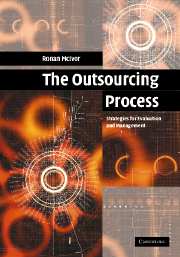Book contents
- Frontmatter
- Contents
- List of figures
- List of tables
- List of illustrations
- Acknowledgements
- 1 Introduction
- 2 The trend towards outsourcing
- 3 Theoretical influences on outsourcing
- 4 The outsourcing process: a framework for evaluation and management
- 5 Determining the current boundary of the organisation
- 6 Activity importance analysis
- 7 Capability analysis
- 8 An analysis of the strategic sourcing options
- 9 Developing the relationship strategy
- 10 Establish, manage and evaluate the relationship
- 11 Case study – outsourcing experiences at Telco
- 12 Conclusions
- Index
- References
4 - The outsourcing process: a framework for evaluation and management
Published online by Cambridge University Press: 21 August 2009
- Frontmatter
- Contents
- List of figures
- List of tables
- List of illustrations
- Acknowledgements
- 1 Introduction
- 2 The trend towards outsourcing
- 3 Theoretical influences on outsourcing
- 4 The outsourcing process: a framework for evaluation and management
- 5 Determining the current boundary of the organisation
- 6 Activity importance analysis
- 7 Capability analysis
- 8 An analysis of the strategic sourcing options
- 9 Developing the relationship strategy
- 10 Establish, manage and evaluate the relationship
- 11 Case study – outsourcing experiences at Telco
- 12 Conclusions
- Index
- References
Summary
Introduction
This chapter provides an overview of the stages involved in evaluating and managing the outsourcing process. Background information outlining the stages in the development of the outsourcing framework is presented. The initial analysis in the development of the framework revealed a number of problems encountered by organisations in their efforts to both evaluate the suitability of outsourcing for their organisation and the management of the outsourcing process. These problems stemmed from the lack of a structured step-by-step approach to the evaluation and management of outsourcing. In addition, it was found that many organisations were misinterpreting the core competence approach, which has had a major influence on outsourcing both in theory and practice. It is shown how the outsourcing framework is influenced by a number of the theoretical perspectives discussed in the previous chapter including transaction cost economics (TCE), the resource-based view (RBV) of the firm, the industry view (IV) and the relational view (RV). An outline of the issues that should be considered in the key stages of the outsourcing framework is presented. This section also provides an outline of the structure of the book in the following chapters. Finally, the theoretical implications of the outsourcing framework are discussed.
Practical problems with the outsourcing process
There is evidence to suggest that organisations have not been achieving the desired benefits from outsourcing.
- Type
- Chapter
- Information
- The Outsourcing ProcessStrategies for Evaluation and Management, pp. 63 - 89Publisher: Cambridge University PressPrint publication year: 2005

